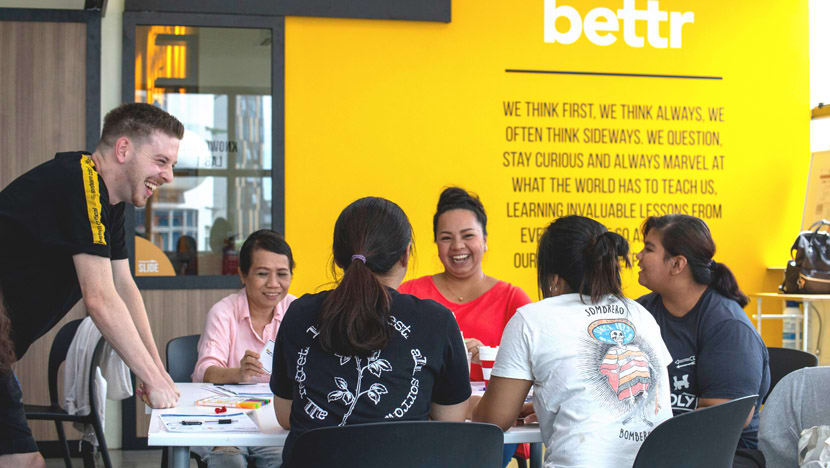
CHAMPIONS OF GOOD RESHAPING BUSINESS ECOSYSTEMS WITH PURPOSE
image caption
CHAMPIONS OF GOOD RESHAPING BUSINESS ECOSYSTEMS WITH PURPOSE
As workers return to the office and organisations adapt to the next normal, two years of pandemic-fuelled remote working has changed employees’ expectations. Businesses and workers have come to appreciate the importance of intangible benefits like mental health support and improved workplace fairness and the usefulness of video conferencing.
For some companies however, it didn’t take a global pandemic for them to put their employees’ needs first.
Take for instance, homegrown specialty coffee company The Bettr Group.
Being habitually late for work may be grounds for a stern talking-to, or even for being fired. However, this organisation tries to find out the reasons for an employee’s tardiness. It then attempts to work out a solution that addresses both the employee’s and company’s needs, such as adjusting the time and duration of their shifts.
Doing this is part of the social enterprise’s ethos, which is that business should be a force for good. Ms Pamela Chng, one of the founders of the Bettr Group – which comprises Bettr Barista and Bettr Coffee Co – explained that many of its employees are marginalised women and youth who hail from disadvantaged backgrounds. Issues such as overcrowding at home and sleep deprivation can impact their ability to be punctual.

In Ms Chng’s view, rethinking the employer-employee relationship is possible – and indeed even beneficial: “It’s about understanding what the individual’s needs and challenges are, and asking, how can we structure work to support them? We have to make the change, because if businesses are not willing to redesign the way they function in the world, it’s impossible to include anybody who doesn’t fit in the box.”
This can reassure workers that their organisations take their wellbeing seriously and increases the likelihood of improved worker retention and performance. For instance, according to Gallup, employees who thrive in career, social, physical, financial and community wellbeing are 81 per cent less likely to search for a new employer in the next year.
BUSINESSES IN PURSUIT OF THE MULTIPLIER EFFECT
The Bettr Group isn’t alone among companies that are pivoting towards being purpose-driven organisations – ones that produce profitable solutions for not just the company, but also for people and the planet.
For instance, SAP Asia – a market leader in enterprise software that helps turn businesses into sustainable, intelligent enterprises – has initiatives that encourage employees to help social enterprises address their business challenges.
Botanical gelato producer Birds of Paradise is positioning its business to create positive outcomes that also involve their network of suppliers, employees and customers.
To be a purposeful and progressive company, Frasers Property seeks to incorporate sustainability practices into every stage of its value chain – from business strategy to operations – in its environmental, social, and governance (ESG) roadmap, which are aligned with the company’s goals such as reducing carbon emissions.
These are just four of 112 organisations that have been conferred as Champions of Good 2022. Launched in 2017 as a national recognition initiative by the National Volunteer and Philanthropy Centre (NVPC)’s Company of Good, it recognises organisations that are not only doing good, but also multiplying the effect of these efforts by collaborating with their partners and stakeholders.
These organisations are moving the needle on what it means to run a business that does good. Going beyond corporate social responsibility efforts that are centred on external initiatives, doing good has now become a core part of business strategy, embedded from the beginning as the driving purpose behind a company’s brand, policies and operations.
From MNCs to SMEs, we take a closer look at how each of these Champions of Good incorporates doing good into its business, and how they seek out connections, build ecosystems and think creatively to multiply the impact of their efforts in doing good.
BETTR GROUP: REDESIGNING A BETTER BUSINESS
The Bettr Group’s Ms Chng recalls how her experience of running her first business, a web consultancy, led her to consider how a business could be restructured, and success redefined in a way that would align with her own values and goals.
“I stumbled upon the idea of a social business where purpose is not just embedded, but at the core of why that business exists,” she said. “It was the hope that we could create a financially, socially and environmentally sustainable business model and show people that it can be done.”
Today, the Bettr Group is Singapore’s very first certified B-Corporation as well as a Champion of Good.
AN ECOSYSTEM FOR DOING GOOD
Over the last decade, the Bettr Group has built a corporate ecosystem that connects it with the government, community and social organisations and corporations. This enables the company to transform lives in a truly sustainable manner, beyond offering training and a job.
According to Ms Chng, even after individuals have been employed, the Bettr Group continues to work with their assigned social workers to ensure that they are supported, as part of its holistic approach to training and development. It also works with corporate partners such as Facebook and Temasek to create inclusive spaces, where newly trained baristas can flourish.














